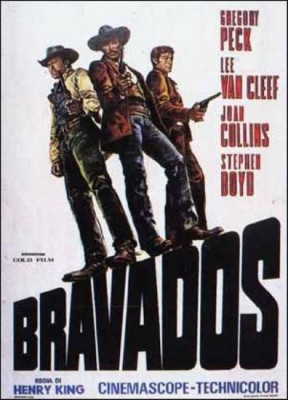| Reviews & Columns |
|
Reviews DVD TV on DVD Blu-ray 4K UHD International DVDs In Theaters Reviews by Studio Video Games Features Collector Series DVDs Easter Egg Database Interviews DVD Talk Radio Feature Articles Columns Anime Talk DVD Savant Horror DVDs The M.O.D. Squad Art House HD Talk Silent DVD
|
DVD Talk Forum |
|
|
| Resources |
|
DVD Price Search Customer Service #'s RCE Info Links |
|
Columns
|
|
|
Bravados, The
Jim Douglass (Peck), a tightlipped stranger, rides into a locked-down border town. Four men - outlaws Bill Zachary (Stephen Boyd), Ed Taylor (Albert Salmi), half-breed Alfonso (Lee Van Cleef) and Mexican Indian Lujan (Henry Silva) - await execution the following morning for the murder of a bank teller during a botched robbery. Jim's appearance in the town isn't clear; he's clearly interested in the men's fate yet also claims not to know them, nor have they met him. He does have a past relationship with one of the town's residents, Josefa Velarde (Joan Collins), who once nearly married him.
Spoilers
The condemned men eventually break out of jail, stabbing the local sheriff in the process, and while the town throws together a disorganized, ill-planned posse, Jim is careful and methodical, determined to hunt them down. He admits to being on their trail for the past six months, and isn't about to give up on them now. It eventually becomes clear Jim blames them for the rape and murder of his wife.
The Bravados quickly establishes the four outlaws, especially violent rapist Zachary as reprehensible criminal types, then spends much of the film questioning Jim's motives for joining the posse, and sets up the possibility that the four may not have raped and murdered Jim's wife after all. Like John Wayne's Ethan Edwards in The Searchers (1956), for Jim tracking these killers is an obsession; he even leaves his motherless child in a servant's care for months while he tracks men who in the end might not even be responsible for his wife's death.
Peck creates an intriguing air of mystery. He says hardly a word during the first few reels, and generally keeps his thoughts (if not his obvious desire to see them dead) to himself. (More spoilers) The picture's climatic scenes, where Jim has at last tracked down Lujan, probably surprised 1958 audiences, as did the film's melancholy coda, with the town hailing Jim as a hero while he considers his actions an unpardonable sin. The film was adapted from a novel by Frank O'Rourke, who also wrote the story that was adapted into The Professionals (1966). Philip Yordan is credited with the screenplay, but Yordan fronted for several blacklisted writers around this time, so it's possible someone else might be responsible for the carefully shaded script. (Unlike many initially-Yordan-credited scripts, since corrected to their original writers, the Blu-ray still credits Yordan, so maybe he did write this one.)
One surprise certainly is the appearance of comedian Joe DeRita as the hangman. Immediately after this, DeRita would join Moe Howard and Larry Fine to become the last incarnation of The Three Stooges. Prior to The Bravados, in the late-1940s, DeRita had starred in a series of awful two-reel comedies at Columbia, and in those shorts and later as "Curly-Joe" with the Stooges, DeRita was singularly unfunny. How he wound up in The Bravados is anyone's guess; he did nothing like it before or afterwards, yet it's a substantial supporting part. He's actually not bad at all, definitely better as a straight character actor than as a knockabout comedian. He's also almost ingeniously cast, given the plot twist involving his character.
Video & Audio
Filmed by Leon Shamroy in CinemaScope, The Bravados is visually quite striking and makes superb use of its location work, all done in Mexico. I could be mistaken, but unlike many recent Fox Blu-ray titles, this appears to be a slightly older transfer. The CinemaScope "mumps," the slight distortion of those early Bausch & Lomb lenses that squashed faces, is still present. More concerning is what seems to be an overuse, sometimes rather extreme, of digital tinkering of all the night scenes, which per modern tastes drains color and light and makes everything a kind of silvery blue. In my review of the earlier DVD I had assumed Shamroy used blue filters to achieve this, but now I'm not so sure. The movie's night scenes certainly don't look anything like other ‘50s films. The 5.1 DTS-HD Master Audio, adapted from the original 4-track magnetic stereo release, is outstanding, with loads of discreet dialogue and effects, while it especially enhances Lionel Newman's excellent score. English subtitles are available and the disc, a limited edition, is region-free.
Extra Features
The supplements include an isolated music track; an interesting trailer, with Peck directly addressing the camera and promising "something different"; two brief Fox Movietone News excerpts plugging the picture, one with Hugh O'Brian demonstrating his quick draw. (He's not in The Bravados.) Julie Kirgo's liner notes round out the extras.
Parting Thoughts
An underrated Western that really looks and sounds great, especially projected on big home theater screens, The Bravados is a must-see, and a DVD Talk Collector Series title.
Stuart Galbraith IV is the Kyoto-based film historian largely absent from reviewing these days while he restores a 200-year-old Japanese farmhouse.
|
| Popular Reviews |
| Sponsored Links |
|
|
| Sponsored Links |
|
|
| Release List | Reviews | Shop | Newsletter | Forum | DVD Giveaways | Blu-Ray | Advertise |
|
Copyright 2024 DVDTalk.com All Rights Reserved. Legal Info, Privacy Policy, Terms of Use,
Manage Preferences,
Your Privacy Choices | |||||||













